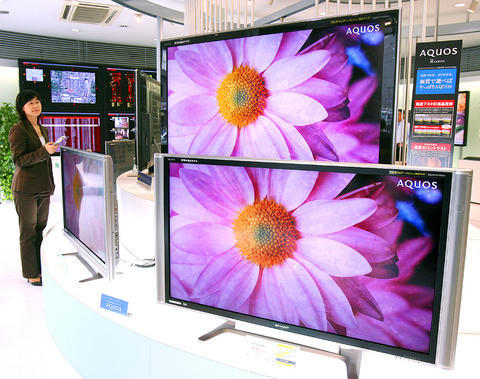Sharp Corp, Japan's largest maker of liquid-crystal displays, will invest ¥380 billion (US$3.2 billion) on a liquid-crystal-display (LCD) factory to help narrow the gap with Sony Corp in the US$56 billion global flat-panel market.
The company plans to construct the plant in Sakai city, Osaka prefecture, in November, with production expected to begin by March 2010, president Mikio Katayama said at a news briefing yesterday. The factory, with a production capacity of 72,000 panels a month, will initially make 36,000 units a month.
Sharp's focus on larger screens helped prices of its LCD TVs gain 4 percent in the first quarter amid an industry slump. The new factory would have lower production costs, helping bolster profitability at the Osaka-based company, which lost the top spot for the first time last year in LCD television sales to Sony and South Korea's Samsung Electronics Co.

PHOTO: AFP
"Sharp's LCD TV sales are not performing well in the US," said Koichi Hariya, an analyst at Mizuho Securities Co who has a "hold" rating on Sharp.
"The company is sandwiched between branded LCD TV makers such as Sony and Samsung, and cheaper non-brand producers," Hariya said.
US Corning Inc and Japan's Asahi Glass Co, the world's top glass substrate makers, are among firms planning to work in the park, the Nihon Keizai Shimbun reported without citing sources.
By having LCD-related companies nearby, Sharp aims to improve efficiency and so better compete with Samsung Electronics and other rivals in the LCD market, the newspaper said.
The electronics manufacturer will also construct a TV assembly plant and a state-of-the-art facility for solar cells, while encouraging chemical, gas and other manufacturers to locate in the industrial park, the Nikkei Shimbun said.
Sharp will spend ¥400 billion over a few years, while parts and materials makers are likely to spend around ¥200 billion, it said.

NATIONAL SECURITY THREAT: An official said that Guan Guan’s comments had gone beyond the threshold of free speech, as she advocated for the destruction of the ROC China-born media influencer Guan Guan’s (關關) residency permit has been revoked for repeatedly posting pro-China content that threatens national security, the National Immigration Agency said yesterday. Guan Guan has said many controversial things in her videos posted to Douyin (抖音), including “the red flag will soon be painted all over Taiwan” and “Taiwan is an inseparable part of China,” while expressing hope for expedited “reunification.” The agency received multiple reports alleging that Guan Guan had advocated for armed reunification last year. After investigating, the agency last month issued a notice requiring her to appear and account for her actions. Guan Guan appeared as required,

A strong cold air mass is expected to arrive tonight, bringing a change in weather and a drop in temperature, the Central Weather Administration (CWA) said. The coldest time would be early on Thursday morning, with temperatures in some areas dipping as low as 8°C, it said. Daytime highs yesterday were 22°C to 24°C in northern and eastern Taiwan, and about 25°C to 28°C in the central and southern regions, it said. However, nighttime lows would dip to about 15°C to 16°C in central and northern Taiwan as well as the northeast, and 17°C to 19°C elsewhere, it said. Tropical Storm Nokaen, currently

‘NATO-PLUS’: ‘Our strategic partners in the Indo-Pacific are facing increasing aggression by the Chinese Communist Party,’ US Representative Rob Wittman said The US House of Representatives on Monday released its version of the Consolidated Appropriations Act, which includes US$1.15 billion to support security cooperation with Taiwan. The omnibus act, covering US$1.2 trillion of spending, allocates US$1 billion for the Taiwan Security Cooperation Initiative, as well as US$150 million for the replacement of defense articles and reimbursement of defense services provided to Taiwan. The fund allocations were based on the US National Defense Authorization Act for fiscal 2026 that was passed by the US Congress last month and authorized up to US$1 billion to the US Defense Security Cooperation Agency in support of the

PAPERS, PLEASE: The gang exploited the high value of the passports, selling them at inflated prices to Chinese buyers, who would treat them as ‘invisibility cloaks’ The Yilan District Court has handed four members of a syndicate prison terms ranging from one year and two months to two years and two months for their involvement in a scheme to purchase Taiwanese passports and resell them abroad at a massive markup. A Chinese human smuggling syndicate purchased Taiwanese passports through local criminal networks, exploiting the passports’ visa-free travel privileges to turn a profit of more than 20 times the original price, the court said. Such criminal organizations enable people to impersonate Taiwanese when entering and exiting Taiwan and other countries, undermining social order and the credibility of the nation’s